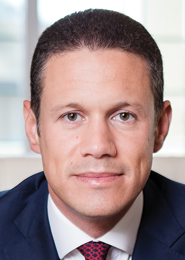- Home
- Media Kit
- Current Issue
- Past Issues
- Ad Specs-Submission
- Ad Print Settings
- Reprints (PDF)
- Photo Specifications (PDF)
- Contact Us

![]()
ONLINE


Badr Jafar
Chief Executive Officer, Crescent Enterprises
Even prior to COVID-19, many parts of the world were facing a multitude of serious challenges including high unemployment, political instability, and humanitarian crises.
As we face these and other challenges going forward, we must ensure that youth in every corner of the globe are given greater access to hope and opportunity.
First and foremost, we need to be honest with our youth, and that means finding creative ways to prepare them for a world in which many of the jobs of today will no longer exist, and the jobs of tomorrow will not be built to last anywhere near as long as the jobs of yesterday. We also need to think about education as a way to equip youth with means to identify and pursue their own strong sense of purpose, rather than simply as a way to prepare them for the labor market.
The key to building resilient societies is not just to ensure that people have access to jobs, but also that people have purpose and meaning in their lives. One of the most immediate things that we can do to help achieve this, and this applies to all regions of the world, is to help create more connected communities, and this begins at the neighborhood level. It may seem obvious, but when people, especially the young, feel like they are part of something bigger than themselves, it becomes easier for them to connect with one another in the pursuit of common interests and goals. Education has an important role to play in this process, but so do businesses, the government, media and other institutional stakeholders in our society.
With education, many of the old models of educating are simply no longer fit for purpose. We therefore need to develop new models of education that are more human-centric, focused less exclusively on developing technical skills and more on developing people. We need to place greater emphasis on mental health, self-confidence, cultivating empathy and compassion, critical thinking, and equipping people with soft skills that will serve them well no matter what happens to one particular industry or another. As long as there are humans walking the earth, these skills will be in demand.
My advice to young people is simple: if you’ve got an idea for a business or social project, go for it.
We have no shortage of talent and creativity in the world, and I would encourage more people to pursue their entrepreneurial spirit and grasp meaningful opportunities wherever they see them. This applies during a pandemic just as much or even more than it ever did. You may not succeed at first – the capacity to fail, and learn from failure, is a critical part of the entrepreneurial journey. What is important is that you fully embrace the journey, and wherever possible live and breathe the problems you are trying to solve. You spend 99.9 percent of your life working on the path, and 0.1 percent experiencing the euphoria of success or the disappointment of failure. If you’re not fulfilled by the journey, you’re wasting your life.
Don’t be afraid to regularly question why you are doing something in order to ensure it is aligned with your sense of purpose and values. And wherever possible, create opportunities for others to put their energies and passions into, as this is the most effective way of building a great team.
Finally, never forget to send the elevator back down. Success without giving back and helping others achieve their potential is not true success.

Badr Jafar
Chief Executive Officer, Crescent Enterprises